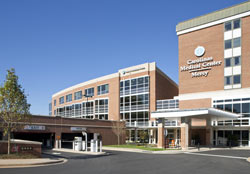About High Point Behavioral Health
High Point Behavioral Health has provided expert care in High Point in North Carolina since 1904. The hospital is now part of Wake Forest Baptist Health family network and serves over 600,000 people. They offer a variety of clinical services that include neuroscience, women’s health and behavioral health.
Treatment in the Least Restrictive Setting
The behavioral health services have been available since 1990. This consists of assessments and inpatient and outpatient treatment programs. They provide 24-hour crisis stabilization and detox to help your individual needs. Chemical dependency treatment can begin with an inpatient program that includes individual and group counseling following detox.
They use an experienced clinical staff who design a tailored plan based on a comprehensive assessment. Their goal is to provide care in the least restrictive and most appropriate setting. Once you have completed an inpatient program, when it’s needed, you can move to outpatient services that can include medication management and psychiatric evaluations.
They treat addiction as a chronic illness that requires ongoing support to prevent relapse. Their medically supervised drug or alcohol detoxification program emphasizes aftercare planning and relapse prevention. During therapy, you learn healthier coping skills and address strategies that help you avoid triggers and prevent relapse.
Referrals Accepted 24/7
They accept referrals from mental health clinicians, physicians, managed care organizations, or employee assistance programs. Family members can also make referrals. They’re available 24/7 to facilitate a referral and will arrange a face-to-face assessment when necessary.
They accept most health insurance providers that include Medicare and Medicaid and will verify your insurance coverage before beginning treatment. If your coverage is not sufficient, you can request a health finance plan to establish a payment structure that fits your budget.
Levels of Care
-
Inpatient
Inpatient and residential programs provide round-the-clock medical and emotional support as you live at the treatment facility. This level of care may be recommended if you have severe addictions or mental health conditions since it removes outside distractions and allows you to focus solely on therapy.
-
Outpatient
In outpatient therapy, you’ll attend therapy sessions several times each week while living at home. This is ideal if you have a strong support system and a lower risk of relapse. Outpatient treatment offers flexibility to maintain work, school or family obligations.
-
Dual Diagnosis
Dual diagnosis programs address substance use disorders and co-occurring mental health conditions simultaneously. This integrated approach to care improves the likelihood of long term recovery and stability by addressing the root causes of addiction.
Detox Service Setting
-
Inpatient Detox
Inpatient detox occurs in a dedicated treatment facility. You’ll live there around the clock and receive intensive medical support and supervision to help manage your withdrawal symptoms. It is suitable for individuals with moderate to severe addictions as it ensures a stable detox environment.
-
Outpatient Detox
Outpatient detox gives you access to medically supervised withdrawal services while still allowing you to live at home. You’ll attend a clinic for treatment and monitoring. This flexible option is suitable for those with mild to moderate withdrawal symptoms who have strong support systems.
Programs
-
Adult (18+)
Adult programs address the substance use and life challenges specific to adults. Therapists can deliver sessions in individual, group and family settings. Services often include job support and life skills training in a structured environment.
-
Alcohol Detox
Alcohol detox programs offer medical support to help individuals withdraw safely from alcohol. Your care team may use medications to ease your symptoms and provide medical monitoring to address complications.
-
Cognitive Behavioral Therapy
Cognitive behavioral therapy focuses on changing harmful thought patterns and behaviors associated with addiction. You’ll learn healthier coping mechanisms by identifying and replacing negative thoughts. This improves your emotional resilience and decreases your relapse potential.
-
Men
Men's programs address substance use while also considering the social pressures, family roles and mental health concerns that are specific to men. You’ll learn healthy coping mechanisms as you build emotional resilience and develop communication skills.
-
Opioid Detox
Opioid detox uses medications to ease severe withdrawal symptoms. It also includes medical supervision to help you manage potential complications. These services allow you to stabilize and begin a recovery plan.
-
Women
Women's programs offer a safe and supportive space to focus on gender specific issues such as trauma, family roles and mental health conditions. Therapists tailor the sessions to address women's needs and foster empowerment in a healing and nurturing environment.
-
Young Adult (18 - 25)
Young adult programs are designed for individuals who are transitioning into adulthood. Topics of discussion typically include identity, independence and peer relationships. Providers may also offer life skills training and career support.
Contact
601 North Elm Street
High Point, NC 27262





